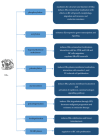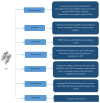Bio-Pathological Functions of Posttranslational Modifications of Histological Biomarkers in Breast Cancer
- PMID: 39275004
- PMCID: PMC11397409
- DOI: 10.3390/molecules29174156
Bio-Pathological Functions of Posttranslational Modifications of Histological Biomarkers in Breast Cancer
Abstract
Proteins are the most common types of biomarkers used in breast cancer (BC) theranostics and management. By definition, a biomarker must be a relevant, objective, stable, and quantifiable biomolecule or other parameter, but proteins are known to exhibit the most variate and profound structural and functional variation. Thus, the proteome is highly dynamic and permanently reshaped and readapted, according to changing microenvironments, to maintain the local cell and tissue homeostasis. It is known that protein posttranslational modifications (PTMs) can affect all aspects of protein function. In this review, we focused our analysis on the different types of PTMs of histological biomarkers in BC. Thus, we analyzed the most common PTMs, including phosphorylation, acetylation, methylation, ubiquitination, SUMOylation, neddylation, palmitoylation, myristoylation, and glycosylation/sialylation/fucosylation of transcription factors, proliferation marker Ki-67, plasma membrane proteins, and histone modifications. Most of these PTMs occur in the presence of cellular stress. We emphasized that these PTMs interfere with these biomarkers maintenance, turnover and lifespan, nuclear or subcellular localization, structure and function, stabilization or inactivation, initiation or silencing of genomic and non-genomic pathways, including transcriptional activities or signaling pathways, mitosis, proteostasis, cell-cell and cell-extracellular matrix (ECM) interactions, membrane trafficking, and PPIs. Moreover, PTMs of these biomarkers orchestrate all hallmark pathways that are dysregulated in BC, playing both pro- and/or antitumoral and context-specific roles in DNA damage, repair and genomic stability, inactivation/activation of tumor-suppressor genes and oncogenes, phenotypic plasticity, epigenetic regulation of gene expression and non-mutational reprogramming, proliferative signaling, endocytosis, cell death, dysregulated TME, invasion and metastasis, including epithelial-mesenchymal/mesenchymal-epithelial transition (EMT/MET), and resistance to therapy or reversal of multidrug therapy resistance. PTMs occur in the nucleus but also at the plasma membrane and cytoplasmic level and induce biomarker translocation with opposite effects. Analysis of protein PTMs allows for the discovery and validation of new biomarkers in BC, mainly for early diagnosis, like extracellular vesicle glycosylation, which may be considered as a potential source of circulating cancer biomarkers.
Keywords: biomarkers; breast cancer (BC); posttranslational modification of proteins (PTMs).
Conflict of interest statement
The authors declare no conflicts of interest.
Figures
Similar articles
-
Roles of Post-Translational Modifications of Transcription Factors Involved in Breast Cancer Hypoxia.Molecules. 2025 Feb 1;30(3):645. doi: 10.3390/molecules30030645. Molecules. 2025. PMID: 39942749 Free PMC article. Review.
-
Post-Translational Modifications of Proteins Orchestrate All Hallmarks of Cancer.Life (Basel). 2025 Jan 18;15(1):126. doi: 10.3390/life15010126. Life (Basel). 2025. PMID: 39860065 Free PMC article. Review.
-
Modifications in the cellular proteome and their clinical application.Medicina (B Aires). 2019;79(Spec 6/1):570-575. Medicina (B Aires). 2019. PMID: 31864228 Review. English.
-
Unconventional posttranslational modification in innate immunity.Cell Mol Life Sci. 2024 Jul 6;81(1):290. doi: 10.1007/s00018-024-05319-8. Cell Mol Life Sci. 2024. PMID: 38970666 Free PMC article. Review.
-
Crosstalk between SUMOylation and other post-translational modifications in breast cancer.Cell Mol Biol Lett. 2024 Aug 10;29(1):107. doi: 10.1186/s11658-024-00624-3. Cell Mol Biol Lett. 2024. PMID: 39127633 Free PMC article. Review.
Cited by
-
Roles of Post-Translational Modifications of Transcription Factors Involved in Breast Cancer Hypoxia.Molecules. 2025 Feb 1;30(3):645. doi: 10.3390/molecules30030645. Molecules. 2025. PMID: 39942749 Free PMC article. Review.
-
Post-Translational Modifications of Proteins Orchestrate All Hallmarks of Cancer.Life (Basel). 2025 Jan 18;15(1):126. doi: 10.3390/life15010126. Life (Basel). 2025. PMID: 39860065 Free PMC article. Review.
References
-
- Lopez-Gonzalez L., Sanchez Cendra A., Sanchez Cendra C., Roberts Cervantes E.D., Espinosa J.C., Pekarek T., Fraile-Martinez O., García-Montero C., Rodriguez-Slocker A.M., Jiménez-Álvarez L., et al. Exploring Biomarkers in Breast Cancer: Hallmarks of Diagnosis, Treatment, and Follow-Up in Clinical Practice. Medicina. 2024;60:168. doi: 10.3390/medicina60010168. - DOI - PMC - PubMed
Publication types
MeSH terms
Substances
Grants and funding
LinkOut - more resources
Full Text Sources
Medical
Miscellaneous



